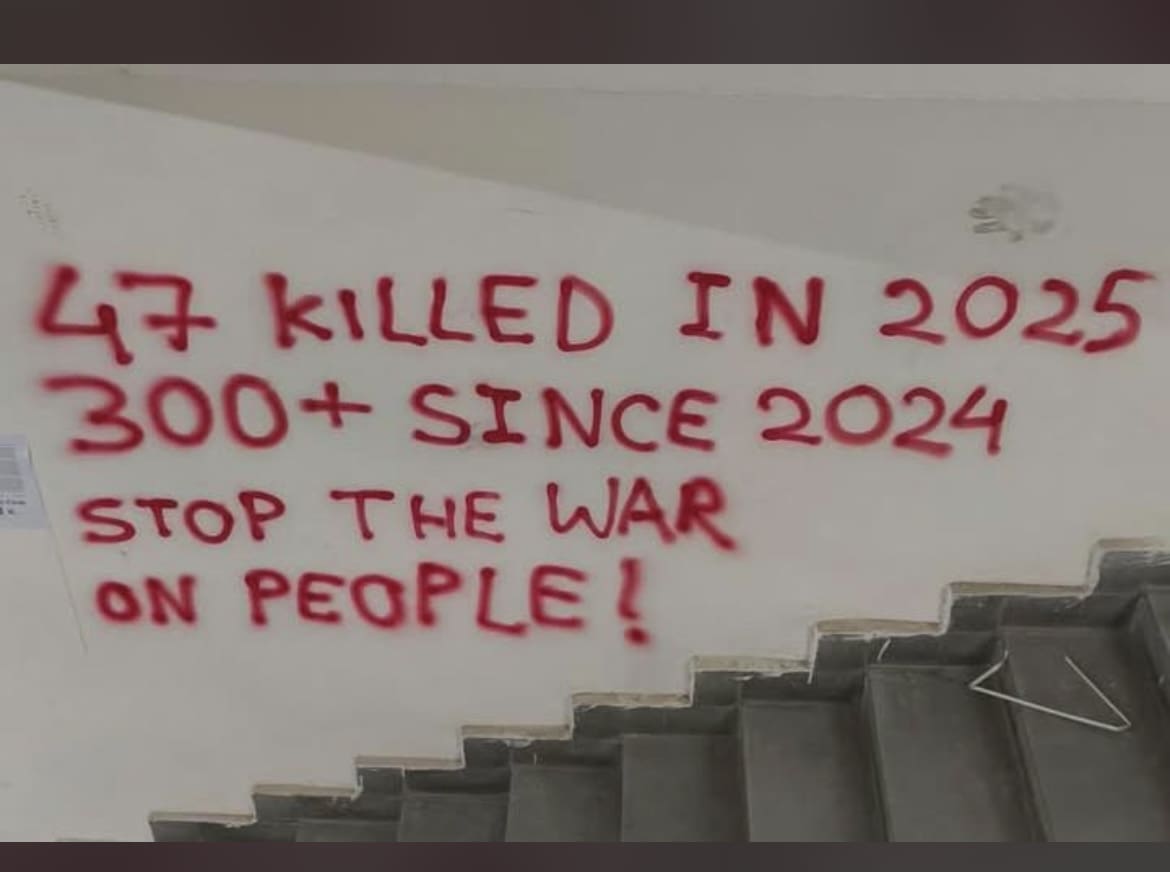Four students from Delhi University were allegedly detained by the Delhi Police for painting murals on campus that highlighted the killings in Chhattisgarh’s Bastar region under ‘Operation Kaagar.’ The students, affiliated with the Bhagat Singh Chhatra Ekta Manch (BSCEM), were picked up in the early hours of February 4 after being caught by university security guards the night before. The students, identified as Gaurav, Gauraang, Kiran, and Rahul, were reportedly beaten in custody and subjected to questioning by the National Investigation Agency (NIA) and the Intelligence Bureau (IB).
Detention and allegations of police brutality
According to Baadal, a BSCEM member, the students were painting murals late on February 3 when they were confronted by security guards, who then called the police. The students were subsequently taken to Vasant Kunj Police Station. “When we reached the police station, we learned that they were brutally beaten. We were also informed that officials from NIA and IB were questioning them,” Baadal told Maktoob Media.
BSCEM released a statement condemning the detentions, calling them illegal and an attack on democratic rights. “The students were raising awareness about the killing of Maoists and Adivasis in Bastar, specifically in the Maad region, under Operation Kaagar. This operation is part of a broader military crackdown known as the Surajkund Scheme, initiated in 2022 under the BJP-led NDA government,” the statement read.
Connections to the larger crackdown on maoist-linked activism
This incident is not isolated. Reports indicate that Delhi University and Jawaharlal Nehru University (JNU) have been at the centre of alleged Maoist indoctrination efforts. Law enforcement agencies have expressed concerns over student activism being linked to a pro-Maoist ideology, often citing incidents like the clash at JNU in 2010 over a meeting against ‘Operation Green Hunt’. Furthermore, accusations have surfaced in the past regarding Delhi University professors allegedly meeting Maoist leaders to strategise resistance against state operations.
The broader scrutiny of academic institutions as hubs of Maoist influence has intensified over the years. A report by The Caravan detailed interactions between security forces and activists like Nandini Sundar, who has been accused of sympathising with Maoists. Her work in Bastar has highlighted police excesses and alleged fake encounters, making her a target of state authorities. This increasing surveillance of intellectuals and students under the pretext of counterinsurgency raises concerns over academic freedom and the right to dissent.
The case of professor G.N. Saibaba: A legal battle against suppression
The treatment of students in this case bears some similarities to the prolonged legal ordeal of Delhi University Professor G.N. Saibaba, who was arrested in 2014 under the Unlawful Activities (Prevention) Act (UAPA) on allegations of Maoist links. Saibaba, who is 90% disabled, was incarcerated for nearly a decade, much of it in solitary confinement, before being acquitted by the Bombay High Court in March 2024.
The court found that there was no substantial evidence to prove conspiracy to wage war against the state, ruling that mere association with suspected individuals does not constitute terrorism. Despite this, Saibaba’s trial was marked by repeated legal obstructions, including a controversial Saturday hearing at the Supreme Court in 2022 that stayed his earlier acquittal. His case has since become a symbol of how counterterrorism laws are being misused to target dissenters and academics.
The involvement of the Supreme Court in finally upholding his acquittal underscores the systemic failures within India’s criminal justice system when it comes to political dissent. Civil rights groups argue that the prolonged incarceration of individuals like Saibaba and the recent detention of DU students reflect a broader trend of criminalising those who challenge state narratives on insurgency and human rights violations.
In this climate, the detention of the four students appears to be part of a wider pattern of criminalising dissent. The involvement of the NIA and IB in the case further underscores how student activism on contentious issues is increasingly being framed as a national security threat. Civil rights groups argue that this approach not only violates fundamental freedoms but also fosters an atmosphere of fear, discouraging engagement with social and political issues that are crucial to democratic discourse.
Police denial and ongoing concerns
Despite these allegations, the police denied any mistreatment or unlawful detention. When contacted, Vasant Kunj Police Station SHO Inspector Balbir Singh dismissed the claims, stating, “Nothing like that is happening here.”
However, student activists insist that the authorities are concealing details of the detention. “This crackdown on dissent is alarming,” said a fellow BSCEM member. “The arrest and abuse of students for merely raising awareness about human rights violations are a direct attack on free speech and democratic rights.”
This incident comes at a time when global discussions on state violence and human rights violations are intensifying. Many activists argue that the government’s crackdown on student-led protests and demonstrations is indicative of a larger pattern of suppression of dissent in India.
Related:
GN Saibaba released from Nagpur central jail after acquittal by Bombay HC
Mere association or support to terror organisation, not sufficient to attract UAPA: SC

